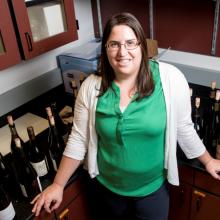Science and Technology of Alcoholic Beverages Certificate Program
100% online, top-shelf education for careers in beer, wine and spirits!
Whether you’re already working in the industry or just getting started, earning an Undergraduate Certificate in the Science and Technology of Alcoholic Beverages online will give you the skills you need to advance as a brewer, distiller or winemaker.
About our online program:
This rigorous online certificate is inspired by Oregon State’s highly regarded fermentation science program and led by its same expert faculty, who are world-renowned for their research in brewing, hop breeding, winemaking and distilling. This is a unique opportunity to understand the biological, chemical and physical principles of fermentation, without needing to complete a four-year degree.
The science you’ll learn will be directly applied, and hugely beneficial, to your day-to-day work in the field.
Program Rigor
This program is very rigorous and requires you to take ownership of your learning and time. The courses are intense and fast-paced. Many of our students juggle work, personal responsibilities and school.
A strong aptitude in chemistry and microbiology is instrumental to success in fermented beverage industries. To help our students access advanced content in fermentation science, we recommend 1 year of college-level general chemistry prior to the start of the certificate program.
We recommend completing organic chemistry, biochemistry, and microbiology via OSU Ecampus. We also accept transfer credits in biology, organic chemistry and microbiology. Click on the hyperlinks for more information, and contact an FST advisor to discuss the fastest path.
FST 251 Intro to Wines, Beers, and Spirits
A descriptive introduction to the history, science, sensory, economics, and societal aspects of alcoholic beverages.
Watch video below for an introduction to the class by Dr. Tom Shellhammer:
FST 479 Fermentation Microbiology
Introduction to fermentation microbiology that emphasizes the evolution of key physiological traits and biochemical pathways within key microbial genera. Explores the microbial ecology of processes used to make alcoholic beverages, food ingredients, and fermented foods.
Upon completion of this course, you will be able to:
- Describe how microbes contribute to qualities of various fermented beverages, fermented foods, and microbially-derived food ingredients.
- Predict the outcomes of variations applied to fermentation systems based upon knowledge of key microbes involved.
- Classify different fermented beverages, foods and food ingredients according to similarities and differences in their raw materials and microbial ecologies.
About the instructor:

Dr. Chris Curtin’s focus is on the role of microbes in alcoholic beverage fermentation, with emphasis on brewing microbiology. He is interested in how the species that we use today to make beer, wine, cider and ethanol have evolved, and to what extent the same evolutionary forces have shaped the microbial ecology and genomes of other microbes found in these production environments. This knowledge can then be used to develop novel brewing starter cultures and management practices that improve microbial stability.
The certificate requires 3 credits of elective coursework. For a list of acceptable electives, please visit OSU catalog.
Choices for electives include:
FST 460 Chemistry and Biochemistry of Beer
Explores the chemistry, biochemistry, microbiology and engineering of malting and brewing operations for the production of beer, including the compositional analysis of barley, malt, hops, water, and beer and their effects on beer quality.
Upon completion of this course, you will be able to:
- Articulate the technological processes and sequences required to malt grain, produce wort and ferment & finish beer
- Identify raw material composition and processing regimes required to produce a desired product
- Design a beer that meets generally acceptable standards
-
Troubleshoot production practices when defects appear
About the instructor:

Dr. Tom Shellhammer is the Nor’Wester Professor of Fermentation Science and is an internationally recognized expert in hops chemistry. His lab studies the contribution of hops to beer flavor, foam and physical & flavor stability. Current projects include investigating specific hop oil component contributions to hoppy aroma and flavor in beer. During the 2008-2009 academic year he conducted research and taught brewing science at the Technical University of Berlin as a Fulbright Scholar and Alexander von Humboldt Fellow. Since 2007 he has served on the Board of Examiners for the Institute of Brewing and Distilling in London, England. He a Fellow of Institute of Food Technologists and the Institute of Brewing and Distilling.
FST 466 Chemistry and Biochemistry of Wine
Explores principles of wine production technology from grape berry development through bottling, covering the microbiology and chemistry and biochemistry of fermentation, aging and production practices of red and white table wines as well as sparkling and dessert wines.
About the instructor:

Dr. Elizabeth Tomasino's research focuses on flavor chemistry, sensory perception, flavor and aroma chemistry of Pinot noir and other winegrapes, and investigating structural chirality of aroma compounds in wine.
Dr. Tomasino's research interests lie in wine sensory analysis and flavor chemistry. A main research includes determining relationships between sensory and chemical data, particularly those aroma compounds important for wine quality and regional differentiation. Current research investigates the presence and concentration of chiral aroma compounds in wine using MDGC. Other interests include the determination of global, regional, sub-regional wine styles, use of sensory analysis for wine education and understanding of consumer preferences, and the influence of non volatile components to wine aroma.
FST 437 Chemistry and Biochemistry of Distilled Spirits
The underlying science of the production of the distilled spirits will be discussed systematically. The course will cover the requirements for water, the major raw materials (eg. cereals, fruits, agave, syrups, and woods for maturation) and the conversion of these into fermentable extract. The scientific principles of fermentation will be explored, in the context of both ethanol and secondary metabolite production. Distillation will be considered, in terms of the physics and chemistry of liquid-liquid separations, before discussing post-fermentation options such as blending, maturation and product finishing.
About the instructor:

Dr. Paul Hughes is a chemist by training and has a broad range of international research and education experiences, in government, private, corporate and university settings, particularly in distilled spirits and brewing science and technology. His research interests include the flavor and non-biological stability of beers and spirits and, more recently the shelf-life stability of hybrid products. His program aims to apply high-quality research, and methodologies developed in other industries, to improve the quality, consistency and production of alcoholic beverages. Never boring and always insightful!
FST 463 Production and Analysis of Beer
Examines the chemical, microbiological, physical, and sensory analysis for assessing beer quality.
Upon completion of this course, you will be able to:
- Explain analytical measurements using industry-recognized standard methods and instrumentation on raw materials, wort and finished products for the purpose of assessing their quality
- Evaluate analytical data from these measurements for the purpose of assessing beer or raw material quality
- Compare and contrast the merits and demerits of different testing methods for beer analysis
About the instructor:

Dr. Tom Shellhammer is the Nor’Wester Professor of Fermentation Science and is an internationally recognized expert in hops chemistry. His lab studies the contribution of hops to beer flavor, foam and physical & flavor stability. Current projects include investigating specific hop oil component contributions to hoppy aroma and flavor in beer. During the 2008-2009 academic year he conducted research and taught brewing science at the Technical University of Berlin as a Fulbright Scholar and Alexander von Humboldt Fellow. Since 2007 he has served on the Board of Examiners for the Institute of Brewing and Distilling in London, England. He a Fellow of Institute of Food Technologists and the Institute of Brewing and Distilling.
FST 469 Production and Analysis of Wine
Examines the fundamentals of red and white wine production including procedures and equipment used and application of key chemical, microbial, and sensory analysis techniques to assess wine.
About the instructor:

Dr. James Osborne's research focuses on microbial spoilage bacteria in wines, impacts of yeast strain on flavor and aroma production from saccharomyces, natural ferment yeasts, acetaldehyde metabolism by malolactic bacteria and its enological consequences, malolactic fermentation, and wine yeast bacteria interactions. Dr. Osborne's extension activities include developing statewide continuing education in enology for the wine industry in Oregon.
FST 439 Production and Analysis of Distilled Spirits
Compares and contrasts different approaches to the manufacture of distilled spirits by using some of the major spirit categories as examples. Discusses the management of a distilled spirits production plant in terms of legislative, safety and process-product quality before explicit consideration of the requirements for establishing a distilled spirits production plant. Provides students with a broad understanding of the distilled spirits sector.
About the instructor:

Dr. Paul Hughes is a chemist by training and has a broad range of international research and education experiences, in government, private, corporate and university settings, particularly in distilled spirits and brewing science and technology. His research interests include the flavor and non-biological stability of beers and spirits and, more recently the shelf-life stability of hybrid products. His program aims to apply high-quality research, and methodologies developed in other industries, to improve the quality, consistency and production of alcoholic beverages. Never boring and always insightful!
Schedule for Classes and their Prerequisites
| Spring 2024 | BI 204: Biology I | FST 251: Intro to Beverages |
|---|---|---|
| Fall 2024 | BI 206: Biology III | CH 331: Organic Chemistry I |
| Winter 2025 | BI 205: Biology II | CH 332: Organic Chemistry II |
| Spring 2025 | BB 350: Biochemistry | FST 437: Spirits Chemistry |
| Summer 2025 | Internship & Elective | MB 302: Microbiology |
| Fall 2025 | FST 460: Beer Chemistry | FST 439: Spirits Production |
| Winter 2026 | FST 463: Beer Production | FST 466: Wine Chemistry |
| Spring 2026 | FST 467: Wine Production | FST 479: Fermentation Microbiology |
FAQ
-
Q: I don't have a science degree or technical background. Will I be able to take this certificate?
- A: As a technology-based certificate, some of the courses in the program has prerequisite science courses such as organic chemistry and cellular biology. If you intend to complete these courses at a different institution, please discuss with us before you enroll.
-
Q: Which campus do I select during the application process?
- A: You would be selecting "Ecampus", and then choose the "Science and Technology of Alcoholic Beverages Certificate" as the program.
-
Q: How long does it take to complete the certificate?
- The certificate has 27 credits, although you might need to take microbiology and biochemistry (both available online at OSU) to fulfill prerequisites for certain courses in the program. Contact us and we can work with you to create a course schedule that fits your needs.
-
Q: I'm only interested in a couple classes in the certificate curriculum. May I only take those classes and not complete the certificate?
- A: Yes! Once you have enrolled in the certificate program, you can freely choose the classes offered in our curriculum. To obtain the transcript-visible certificate, however, you do need to complete all of the requirements for the certificate.
